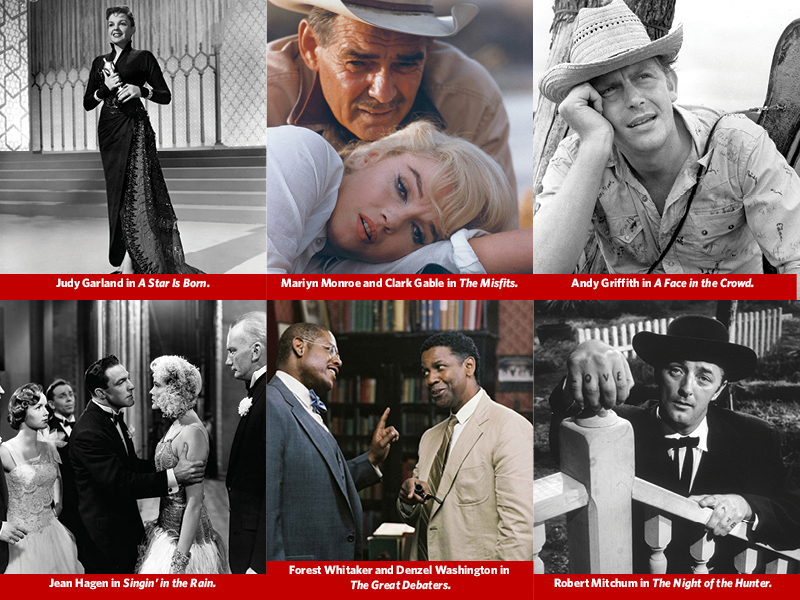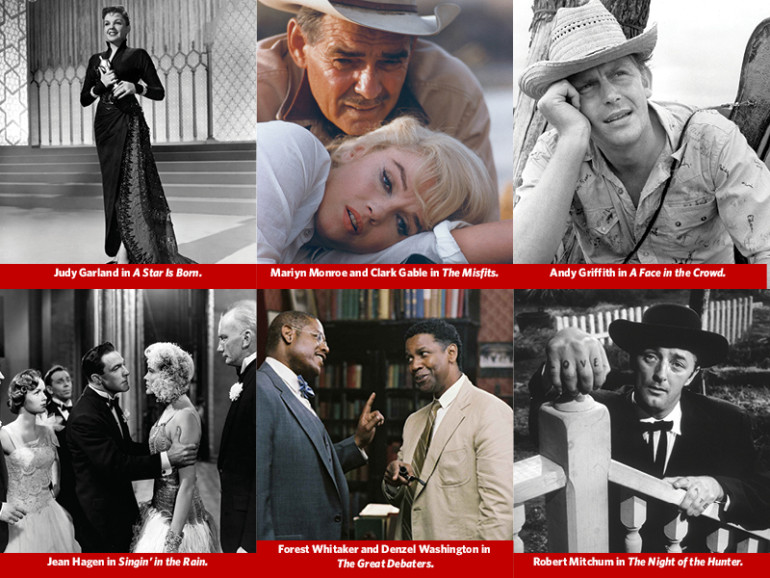
ALL IMAGES MPTVIMAGES.COM EXCEPT THE GREAT DEBATERS
A brilliant movie came out in 2008. The kind of movie that makes us love the movies. It was called Me and Orson Welles. Though Zac Efron and Claire Danes got the press, and director Richard Linklater received praise, the centerpiece of the movie is an amazing portrayal by Christian McKay as Welles. McKay brings insight and veracity to Welles as he (in the movie) directs a Mercury Theatre production of Julius Caesar. Every moment of the film flows from this strong, secure performance. Did the film get nominated for any Oscars? As fast as you can say Gloria Swanson in Sunset Boulevard losing the Oscar to Judy Holliday in Born Yesterday — no.
Movies can change our lives; cinema can illuminate and inspire. From Gentlemen’s Agreement to Harold and Maude to The King’s Speech, celluloid moments have stayed in my head and my heart. When I saw The Great Debaters in 2007, I stood up and applauded a true story of courage and action. This film takes place in 1935 and stars Denzel Washington as a professor at a small college in Texas who inspires a successful debate team that goes on to challenge Harvard. Perhaps I loved this smart movie because I was a debater as a student. We all gravitate toward movies that reflect our experiences. I had a speech defect as a child, and The King’s Speech wasn’t about a monarch so much as any of us who tried to defeat stutters and lisps. I took a debating college student friend to see The Great Debaters, and his excitement and enthusiasm reminded me that great movies live for all of us. There’s no debate. The Great Debaters should have been nominated — but it wasn’t.
Classic Snubs
When an actor or actress creates an unforgettable character, it is important for the art of cinema and for fans to see that performer Oscar nominated, if not win. Terence Stamp gave a classy, brave and vulnerable performance as Bernadette Bassinger in 1994’s The Adventures of Priscilla, Queen of the Desert. As a transsexual joining two drag queen friends while they travel across the Australian desert, Stamp never tries to make Bernadette the best singer, dancer or comic. She just has tremendous heart, a quality not easy to communicate. Her co-stars Guy Pearce and Hugo Weaving deserved nominations too, as did writer/director Stephan Elliott, but it is Terence Stamp’s beautiful Bernadette that has so many of us rooting, “You go, girl.”
Movie buffs all over the world know the name Lina Lamont. As her leading man’s buddy Cosmo Brown (played by Donald O’Connor) describes her, “can’t act, can’t dance, can’t sing — triple threat.” The movie is Singin’ in the Rain. In the 1952 film, actress Jean Hagen lets out all the stops in her portrayal of a vain, clueless silent movie star. Much of this musical classic is based on fact, showing us the tumultuous transition from silent film to talkies and the fate of stars like Lamont who had tremendous egos and did not fathom their careers hanging by a microphone. Hagen steals every frame as Lina, and it is hard to believe she did not win the Oscar for best supporting actress. She lost it to that fascinating film fatale, Gloria Grahame in The Bad and the Beautiful. When we see Jean Hagen in any other film (The Asphalt Jungle, Adam’s Rib), it’s hard to imagine this is the person who played Lina Lamont. And it’s hard to imagine anyone else playing her.
Sometimes there is no answer for a great film being completely passed over for an Oscar other than it was too hip for the house. In 1957 an amazing movie was written by Budd Schulberg and directed by Elia Kazan. Starring an unknown Andy Griffith, it told the story of Lonesome Rhodes, an Arkansas drifter who becomes a media sensation, drunk with fame and power. Like the Paddy Chayefsky/Sidney Lumet classic Network, A Face in the Crowd was ahead of its time in its indictment of the media’s ability to manipulate the masses with image over substance. In his Cahiers du Cinéma review of the film, director Francois Truffaut called it a “great and beautiful work whose importance transcends the dimensions of a cinema review.” No nominations, but a film that lives forever.
Judy Garland and Marilyn Monroe had an important quality in common. Both showed us open wounds. We loved them because we could see their pain. Both gave remarkable performances that should have not only been nominated but taken home the gold. Garland came close with 1954’s A Star Is Born, but lost to Grace Kelly in The Country Girl. Watch Garland in A Star Is Born; it is clear she should have won. Monroe used to say, “It takes a smart brunette to play a dumb blonde.” She makes that clear in 1961’s The Misfits, a movie where her character is so internally devastated that Clark Gable says to her, “What makes you so sad? … You’re the saddest girl I’ve ever seen.” And she is, a woman trapped in the world of dark and shadows. A brave actress. Never nominated, she reminds us, as does twice-nominated Garland, that talent will win out every time, and will last forever.
Celebrating Cinema
The Oscars are a chance for movies to be noticed. For an unfathomable reason, The Night of the Hunter missed all of the categories — nominations or wins. This is a dark movie about a backwoods preacher chasing two children for their father’s money. It’s often terrifying due to director Charles Laughton’s creative use of German Expressionism, including odd camera angles and wicked lighting. How could this film — adapted by James Agee and Laughton from a 1953 novel and starring Robert Mitchum, Shelly Winters and Lillian Gish — be overlooked in 1955? It was the year of On the Waterfront, The Caine Mutiny and Seven Brides for Seven Brothers — but there must have been room for the film David Lynch, Martin Scorsese and the Coen brothers have said influences them to this day. Mitchum, one of our best actors, was only nominated once in his long career, for best supporting actor in 1945’s The Story of G.I. Joe. Guess the academy voters were not impressed with The Sundowners, Cape Fear or Ryan’s Daughter, to name a few examples of this unusual actor’s work. In Night of the Hunter, he is a living nightmare.
I’ve been a member of the Directors Guild of America for many years. I watch direction carefully, believing in the auteur theory, the idea that it’s one director, one film. It would be tough to argue that Alfred Hitchcock wasn’t in charge of his movies. Yet the academy never gave him a best director Oscar. He was nominated for Lifeboat, Spellbound, Rear Window and Psycho, yet only his film Rebecca won, for best picture, an award taken home by producer David O. Selznick in 1941. Orson Welles’ Citizen Kane was nominated for writing, the award going to Herman J. Mankiewicz, even with the controversy about who wrote what in the sensational script. But for Welles not to win for directing a movie that stays exciting and relevant and changed the face of cinema forever? That would be like never giving a directing Oscar to Frederico Fellini, James Ivory, Arthur Penn, Stanley Donen, Spike Lee, David Lynch, Sam Peckinpah and so many other deserving artists.
This is a subject that can be argued forever, with everyone a critic. That being said, the Oscars are important in that they remind us of quality over box office, whether we are rooting for our favorites or remembering work that should have been recognized. Any time and any way we celebrate the cinema, we’ve won the gold.


